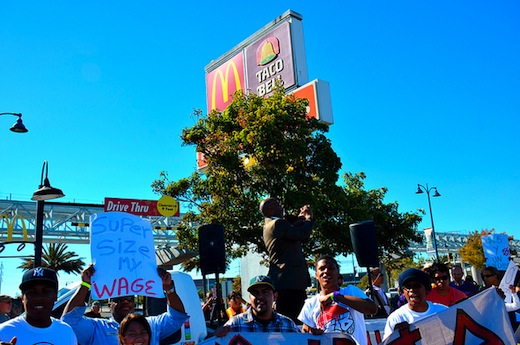
WASHINGTON – Through the Great Recession, the weak recovery since then and even in the business cycle before that, workers’ wages “have been dead in the water for a decade,” the leader of the Economic Policy Institute says.
And that gloomy picture, portrayed by EPI President Larry Mishel, won’t be solved for the overwhelming majority of U.S. workers by the solutions propounded either by Democratic President Barack Obama or his GOP foes on Capitol Hill, Mishel adds.
Mishel and EPI analyst Heidi Shierholz discussed and dissected the economic state of today’s workers – and their prospects – in a news conference yesterday where they released their new policy paper, keyed to Labor Day: A Decade Of Flat Wages The Key Barrier To Shared Prosperity And A Rising Middle Class.
While the U.S. economy is finally creating jobs, they’re not good jobs, and that’s what the government should focus on and change its policies to create, the two said.
“From the point of view of the vast middle class and the low-wage workers, the problem they have is the paycheck they take home,” Mishel said.
What their policy paper found was not good, ever since 2000:
Worker productivity is up 7.7 percent since the start of the Great Recession in 2007, but wages dropped for the bottom 70 percent of all workers, stayed flat for those in the 70th-80th percentiles – and rose only for the very rich. That continued a trend that started in 2001: Productivity grew by 25 percent since 2000, but the bottom 60% of workers who achieved that success saw their wages drop.
Disturbingly, there is data in the report that shows higher education is no longer translating into better wages. “Wages of workers with a bachelor’s degree were lower in 2012 than in 2002, 10 years earlier,” the report says. “Real wage gains have eluded the vast majority over the last 10 years, including those with college degrees” and below that. The only exception, where gains are small, has been among workers with masters’ degrees or better, the report notes.
“This has even been true for those in science, technology, engineering, and math occupations and for those in business occupations,” the report says. “Education can’t fix it,” Mishel said of the long-term stagnation and decline in workers’ wages. “In the 1980s, the college education wage premium grew rapidly. That era is long behind us.”
The problem is particularly acute for workers in the bottom 20 percent, who have seen the largest income declines. Male workers with a high school diploma saw their wages drop 3.5 percent since the start of the crash alone, on top of earlier declines. High-school-only female workers saw their incomes fall by 2.7 percent in the same six years.
“The low-wage workers’ strikes demonstrate the problem in bold detail,” Mishel said. “It’s essential we take bold steps to address them.”
“We need to establish broad-based wage growth at the bottom” of the income ladder “to extend” the middle class and prosperity, Mishel said.
The jobless rate has dropped from its high of almost 10 percent in the depths of the Great Recession, down to 7.4 percent. “But it’ll be another two years before we get to 6.3 percent unemployment, and that was the high in the 2001 recession,” Shierholz said. The big reason joblessness dropped is because people left the workforce, she added. “If everyone seeking jobs before the crash hit were still looking, the rate would be 9.4 percent.”
The high jobless rate depresses wages. As a result, low demand – because workers lack jobs and pay – makes it unnecessary for business to hire more workers, Shierholz said. If firms need more production, they order speedups, or pile on overtime.
“And with so few job opportunities, employers do not have to offer wage increases to get the workers they need,” she noted.
The solution, they said, is not only to focus on specific fixes, such as more construction and infrastructure jobs, encouraging education, raising the minimum wage and indexing it to wage growth. All are good moves, but they’re not enough.
“The disappointing wage trend is the result of acts of omission and commission by policymakers in economic policy, and not by technology or other factors beyond their control,” Mishel declared. “Policymakers should view achieving broad-based wage growth as the lens through which they view every form of growth” and every policy.
“We need to improve the ability to have people join unions, to firm up our labor standards, which have weakened through 2010, and allow undocumented workers to become citizens,” Mishel said. “Those policies will raise wages for them and for every-body else.” Allowing more exploited “guest workers” in, as the GOP proposes, would take 300,000-400,000 of the new jobs the economy is creating every year, or approxi-mately 40 percent of all new jobs, he said. To gain GOP votes, the Senate-passed bipartisan immigration bill doubled an original guest worker limit of 200,000 jobs yearly.
Photo: Fast food workers strike at McDonald’s/Taco Bell, Aug. 29, demanding the giant corporations “super size” their wages. (Steve Rhodes)










